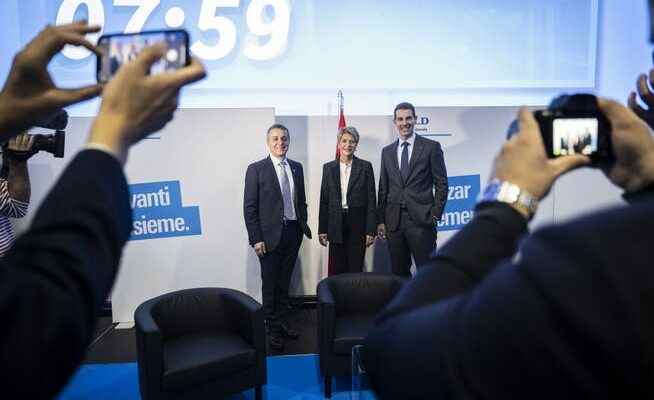According to the Minister of Justice, Serbia wants to adapt its controversial visa practice for certain countries more quickly. It is unacceptable that hardly any vulnerable people are smuggled to Europe.
Justice Minister Karin Keller-Sutter spoke on the day of the FDP about the migration crisis (pictured with Federal President Ignazio Cassis and party President Thierry Burkart).
It is also a success for Karin Keller-Sutter. Serbia has announced that it will adjust its visa policy for Tunisia, Burundi, India and Cuba by the end of the year. The EU Commission got involved after Switzerland, Austria, Germany and France had requested this. Now it should go faster. On the day of the FDP in Burgdorf, Keller-Sutter announced on Saturday that Serbia would end its previous visa practice for Burundi. For Tunisia, the step should follow on November 20th. She learned the good news on Friday night, she said.
Keller-Sutter also commented on the subject in the Saturday broadcast of the SRF radio. Serbia is close to the Schengen area, she said. It is not possible for Belgrade to grant visa-free travel to some countries in the current situation – and to burden the Schengen member states. Citizens from the countries in question fly to Serbia. From there they try to get to the EU states of Hungary or Croatia with the help of smugglers. Migration via this route was strongly fueled, said the FDP Federal Councilor.
The leverage of the EU
Switzerland and Austria alone would not have had any leverage. But Bern and Vienna would have brought Germany and France on board. Together, the states turned to the EU Commission. This has a lever, said Keller-Sutter. Brussels could have stopped visa-free entry for Balkan countries. In addition, Serbia is an EU candidate. “The Schengen countries must say clearly that it is unacceptable that people who are hardly in need of protection are smuggled into Europe.”
The Swiss Minister of Justice hopes that the adjustment of the Serbian visa policy will help ensure that the tense situation does not deteriorate any further. The federal government had to correct its forecasts upwards again on Thursday. He expects around 22,000 asylum applications for the current year. The last time that many asylum seekers came to Switzerland in one month was during the 2015/2016 refugee crisis.
Switzerland, with its accelerated asylum procedures, is not attractive for people who do not need protection, said Keller-Sutter. “We don’t want to be dictated by smugglers who can come to Europe and who can’t.” According to the Federal Councilor, the aim is to provide protection to people who actually need it. The cantons should not be overburdened with this.
sow discord
In addition to the increasing number of asylum seekers, there are already around 66,000 people seeking protection from Ukraine who have been accepted by Switzerland. The Minister of Justice expects the flight movement to continue over the winter, as she said in Burgdorf. Solidarity is important. But the enormous flows would also lead to domestic tensions. Keller-Sutter spoke of hybrid warfare. Russia is about sowing discord.
A return of those seeking protection from Ukraine is currently not realistic. Nevertheless, Keller-Sutter outlined to the radio the conditions under which this would be possible. “At a minimum, it would require a ceasefire that is internationally controlled.” The Federal Councilor referred to Switzerland’s experiences with the Balkan wars. In Bosnia there was the Dayton peace agreement, and in Kosovo there was an international peacekeeping force.
